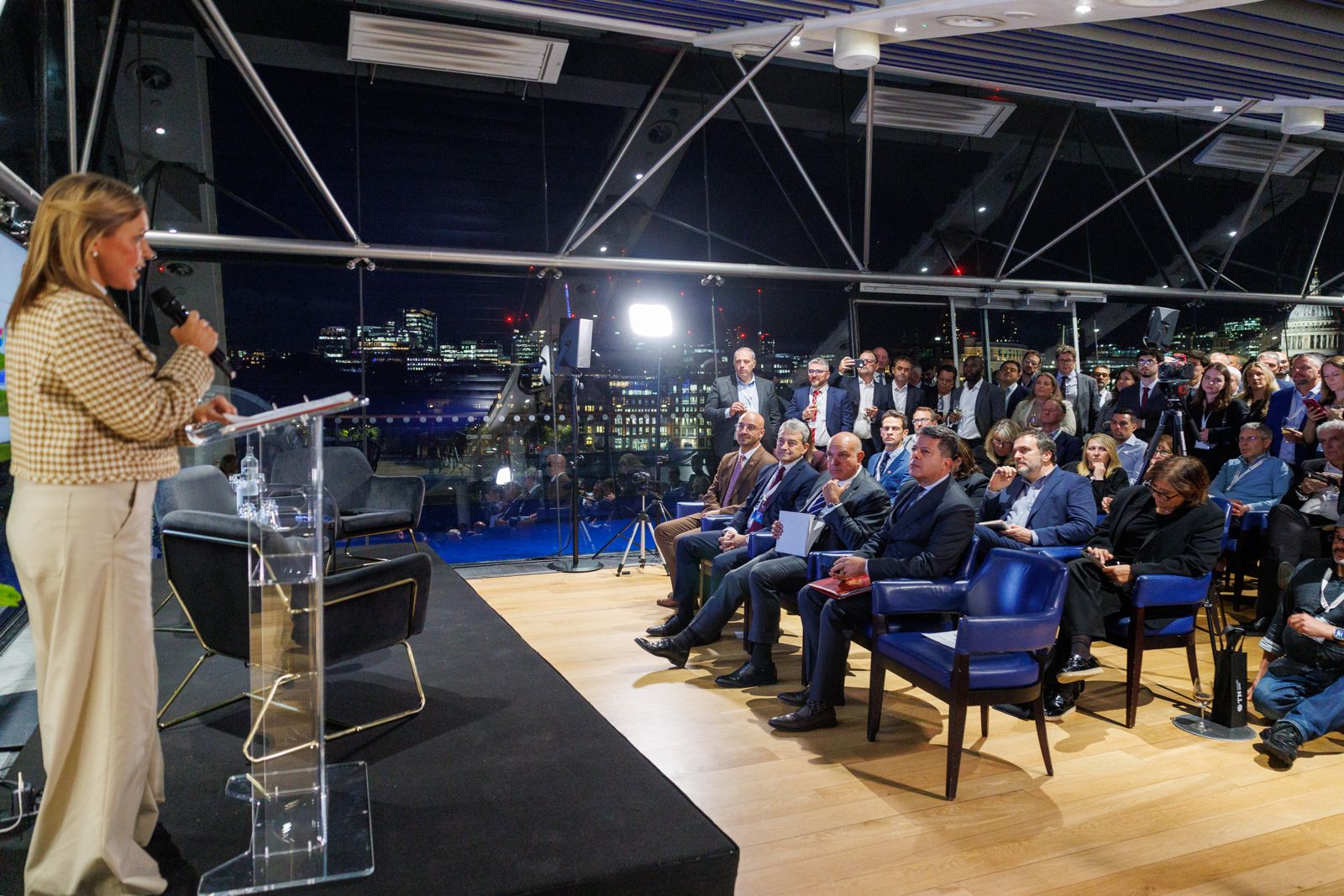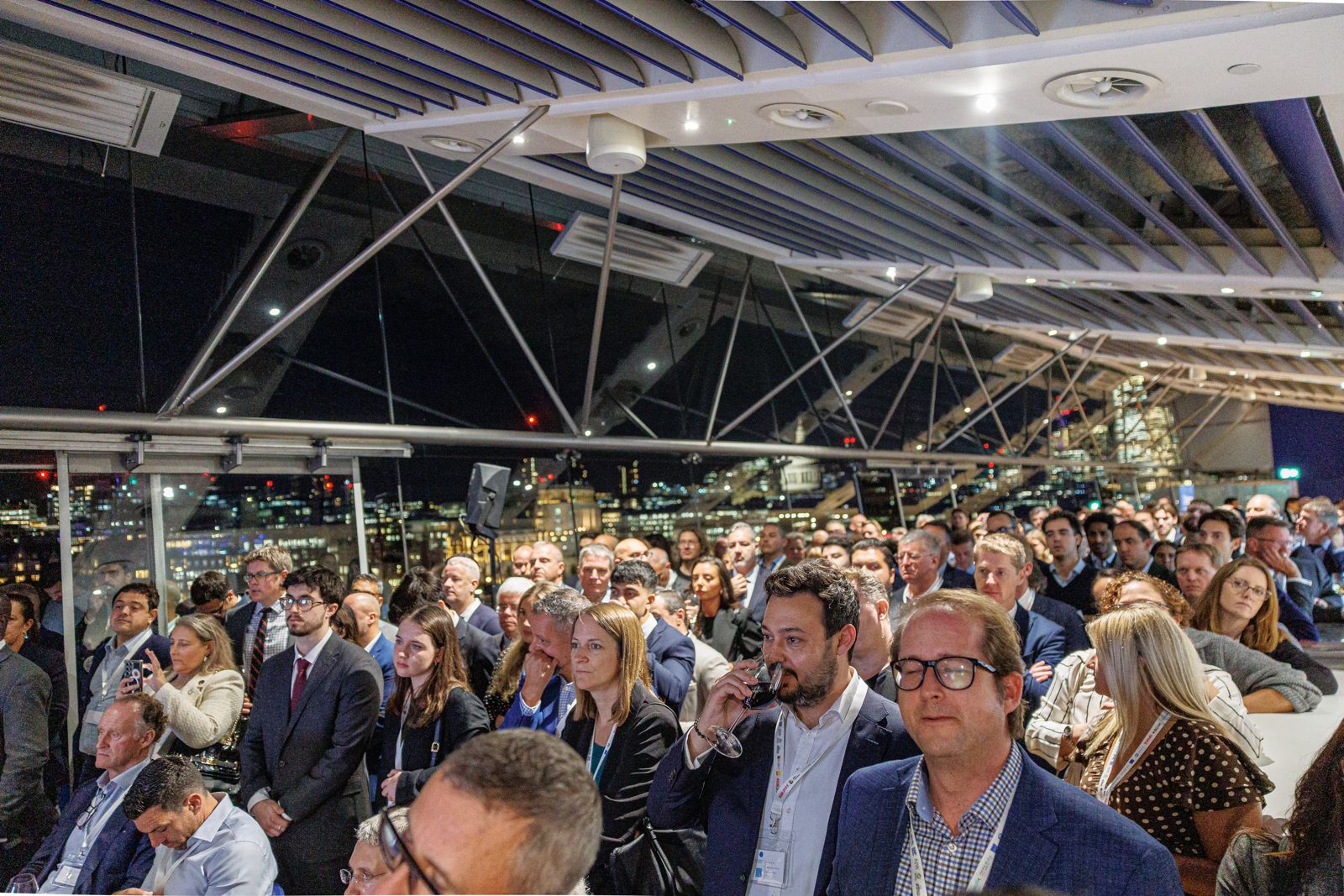London business conference hears treaty opportunities and invitation to ‘come and surprise us’
Photos by Johnny Bugeja
The future UK/EU treaty on Gibraltar will create economic opportunities that go beyond headline provisions on border fluidity, offering potential that only investors and business leaders may fully recognise, Chief Minister Fabian Picardo said on Tuesday.
Speaking during a fireside chat at the inaugural Gibraltar Business Conference in London’s OXO Tower, Mr Picardo described the treaty as a strategic turning point that would allow businesses to unlock new cross-border models in goods, services and infrastructure.
Addressing an audience of over 400 people from a broad range of business sectors, most of them UK based, he encouraged investors and entrepreneurs to seize the moment.
“You negotiate for the sectors that exist, but you don't know what’s coming,” Mr Picardo said of Gibraltar’s approach to the treaty negotiation.
“The guys who know what’s coming are out there, they’re not up here [on the panel].”

Mr Picardo said the Government was focused on providing a stable platform through regulation, market access and tax transparency, while leaving it to the private sector to identify the most promising areas for growth.
“Ask yourself, should I really be anywhere other than Gibraltar when I’m establishing this new business?” he said.
“Come and surprise us, because there will be sectors we have not even imagined could benefit from this treaty and these arrangements.”
This was the first business conference organised as part of the Gibraltar Day events in London and it sought to bring together representatives from different sectors who all had one thing in common, Gibraltar.
Organised by Business Minister Gemma Arias Vasquez and her team led by John Paul Fa, the chief executive for business and the Office of Fair Trading, the event attracted over 400 attendees, with a waiting list of over 60 people that had hoped to get in. It was fully funded through corporate sponsorship.
In opening remarks, Mrs Arias Vasquez set out Gibraltar’s renewed ambition to position itself as a leading business hub ahead of the expected UK/EU treaty.
“Gibraltar is upping its game,” she said.
“Gibraltar is perfecting its product. Gibraltar is open for business.”

Mrs Arias Vasquez highlighted the diverse representation in the room “from every corner of industry” and described the conference as a natural progression from the week’s earlier financial services events.
She said the aim was to send a strong message to London, a city with which Gibraltar shares “a long and trusted relationship”, that Gibraltar’s business proposition is stronger than ever.
Addressing recent concerns about a pause on new long-term residency applications, she stressed that this was a measure to ensure access remains “fair, transparent and sustainable”, and not a signal of restriction.
“For genuine investors, entrepreneurs, professionals and innovators, Gibraltar continues to welcome you with open arms,” she told guests.
Central to her remarks was the importance of the forthcoming treaty, which she described as “the most transformative development in Gibraltar’s modern business story.”
The treaty, she said, is not just about mobility and goods but about “certainty that gives investors confidence, allows businesses to plan ahead, and provides our workforce with stability and growth.”
Underlining Gibraltar’s ambition and potential, she called on attendees to be part of shaping what comes next.
“Tonight is just one of the many seeds we are planting,” she said.
“This treaty doesn’t just enhance the opportunities we already have, it turbo charges them.”

DUALITY
The four-hour event at the OXO Tower started with a series of fireside chats looking at different aspects of business and life in Gibraltar, followed by a networking opportunity over drinks and canapes on the eighth floor of the riverside building with the Thames and London skyline as the backdrop.
There were sound problems that marred some of the early conversations but there was keen interest from guests and a vibrant buzz in the two large rooms hired for the event.
But it was a panel chat with the Chief Minister and Attorney General Michael Llamas, the two central players in the Gibraltar negotiating team alongside Deputy Chief Minister Dr Joseph Garcia, that was the main event of the evening.
The conversation was moderated by Hassans partner and prominent Gibraltar lawyer Peter Montegriffo, who explored key themes in the treaty and the opportunities it could unlock.
The Attorney General said the treaty was structured on a well-established EU legal base and would create long-term certainty for investors, with provisions on the movement of goods and people at its core, measures to allow flights to other destinations in the EU, and additional chapters on issues such as law enforcement and criminal justice cooperation, among others.
“We’re still working on the detail but the current draft is over 250 pages long, with a very large number of protocols, annexes and administrative arrangements, some of which feed of European law as well,” he said, adding it was inspired in part by the UK/EU Trade and Cooperation Agreement.
Summarising the significance of the proposed treaty, Mr Montegriffo said: “This is a legal framework which should provide stability for Gibraltar and the area in a way, frankly, that we have not enjoyed within living memory.”
“There is really a completely new ecosystem emerging from this treaty that is completely unprecedented.”

One of the most significant changes will be the creation of a bespoke customs union between Gibraltar and the EU allowing for the frictionless movement of goods.
While goods placed on the Gibraltar market must comply with EU standards, VAT will not apply. Instead, a transaction tax will be used to preserve Gibraltar’s fiscal model while maintaining market access.
The treaty sought primarily to ensure arrangements that protected Gibraltar’s existing sectors such as financial services and gaming, preserving the existing status quo.
But guests heard the arrangements could potentially also open the door to new production models including high-value assembly and final manufacturing within Gibraltar.
Mr Picardo said that while Gibraltar had not actively negotiated for manufacturing opportunities, the treaty architecture now made them viable.
“You might be able to do just the final production element, assembly and production, in Gibraltar,” he said.
Mr Llamas added that manufacturers could sell into the EU provided they met the necessary standards.
“So long as the requirement of complying with EU standards is met, it is an open market into the rest of the EU,” he said.
The discussion also highlighted the dual market position Gibraltar will occupy once the treaty is in place.
With continued access to the UK for services and new access to the EU for goods, Mr Picardo said the territory was uniquely positioned.
“You have a metaphysical single market with the UK…and a physical single market with the EU,” he said.
The panel identified several sectors that could benefit immediately, including luxury retail, online education, logistics and legal structuring.
While the Gibraltar treaty does not cover services, existing EU rules allow for the cross-border provision of certain services from third countries. Mr Llamas confirmed that this includes areas such as digital education and consulting.
In addition, the combination of the treaty and the existing Gibraltar-Spain tax agreement may make Gibraltar an attractive platform for Anglo-Saxon investors looking at new business in Spain.
Mr Picardo said the transparency provided by the tax treaty, coupled to the stability provided by the new treaty being finalised, would remove historical doubts about using Gibraltar-based structures for Spanish investments.
“If you take a common law vehicle from any other jurisdiction, it won't have that transparency immediately to the Spanish authorities,” he said.
“It might therefore find some element of resistance.”
“But a Gibraltar company can now be used to purchase, for example, a property in Madrid and if there is a shareholders’ dispute, that dispute is resolved in the Supreme Court of Gibraltar…in keeping with common law mechanisms rather than a civil law dispute in a Spanish court in a foreign language.”
In the cross-border context, the treaty’s provisions on frontier workers are expected to support business continuity.
“UK British nationals can still apply to live in Spain as they've always done,” Mr Llamas said.
“What we hope is if they need to go through the list of conditions and one of them is to prove gainful employment, that employment in Gibraltar would be deemed to be the same as having employment for the purposes of acquiring residency in Spain.”
On the back of this, Mr Picardo said Gibraltar would be better placed to outsource services across the border and help drive growth in the surrounding region.
“A more prosperous Campo de Gibraltar is good for all of us,” he said.
MONACO
Mr Picardo addressed too concerns in some quarters that the treaty “is going to make Gibraltar like Monaco”, where high prices have driven local people into neighbouring France.
“I don't want to suggest that there's anything about Monaco which might not be absolutely lovely, but there's going to be something about Gibraltar which is going to be particular to Gibraltar,” he said.
“The Gibraltarians are never going to have to leave Gibraltar because it becomes too expensive for them to live there.”
“But we want to attract people who are going to come to Gibraltar to do business, who are going to come and work in the many businesses that will be attracted to Gibraltar, and they too, should be able to live in Gibraltar or around Gibraltar, because that will be another way that we will spread shared prosperity.”
Looking to workforce development, the Chief Minister said a joint fund between the UK, Gibraltar and the EU would be used to train people from both sides of the frontier in skills needed by growing sectors. These could include English for business, coding or actuarial analysis.
“We'll always be open to enable you to bring someone that you need for your business,” he told guests.
“But it would be even better if we can provide a homegrown trained and educated resource, from whichever side of the frontier that person may originate.”

RUBICON
Tourism was also cited as a key area of early growth, particularly due to the removal of uncertainty at the border.
Mr Picardo said Gibraltar would now be able to support more diverse offerings, including evening leisure and fine dining that had previously been constrained by frontier unpredictability.
“There can be new services provided in Gibraltar,” he said.
“People might not have wanted to drive to Gibraltar not knowing whether there would be a queue to get in, whether there might be a queue to get out. That is not going to be a factor anymore.”
The maritime sector, particularly in services such as spares, provisions, and logistics, is also expected to benefit.
Mr Llamas confirmed that as long as services are provided to vessels departing for international waters, Gibraltar retains flexibility in how those are delivered.
Mr Picardo said the treaty was an inflection point that will reshape not only Gibraltar’s relationship with the EU but its role as a business hub in the wider region.
“When we sign this treaty, we’re crossing a Rubicon,” he said.
“We’re really taking a step forward into a future which will be different to how we have understood our relationship not just with the European Union, but our relationship with Spain.”
“It's a very positive step that we're taking because we're taking it with all of the perennial issues put to one side, putting the creation of prosperity shared across that front frontier at the forefront of what it is that we're trying to achieve.”









